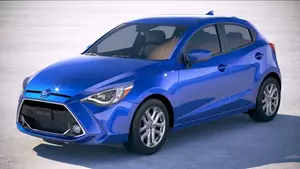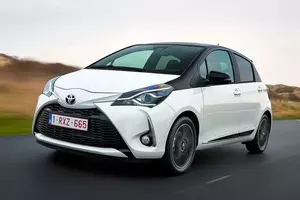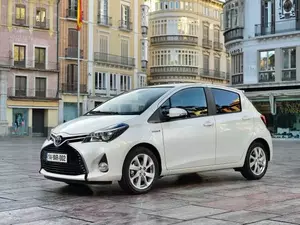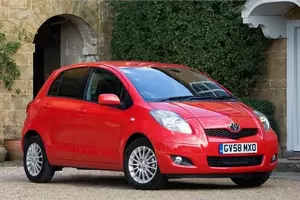
| Vehicle | Curb weight | Difference from world's smallest | Weight to power ratio | 0—60 mph acceleration ratio | Consumption ratio |
|---|---|---|---|---|---|
| 1.0 |
940 kg / 2073 lbs |
515 kg (1136 lbs) heavier | 14 kg to 1 hp | - | - |
| 1.5 |
1160 kg / 2558 lbs |
735 kg (1621 lbs) heavier | 13 kg to 1 hp | - | - |
| GR 1.6 |
1280 kg / 2822 lbs |
855 kg (1885 lbs) heavier | 5 kg to 1 hp | - | - |
| Vehicle | 1.0 |
|---|---|
| Curb weight |
940 kg / 2073 lbs |
| Difference from world's smallest | 515 kg (515 lbs) heavier |
| Weight to power ratio | 14 kg to 1 hp |
| 0—60 mph acceleration ratio | - |
| Consumption ratio | - |
| Vehicle | 1.5 |
| Curb weight |
1160 kg / 2558 lbs |
| Difference from world's smallest | 735 kg (735 lbs) heavier |
| Weight to power ratio | 13 kg to 1 hp |
| 0—60 mph acceleration ratio | - |
| Consumption ratio | - |
| Vehicle | GR 1.6 |
| Curb weight |
1280 kg / 2822 lbs |
| Difference from world's smallest | 855 kg (855 lbs) heavier |
| Weight to power ratio | 5 kg to 1 hp |
| 0—60 mph acceleration ratio | - |
| Consumption ratio | - |

| Vehicle | Curb weight | Difference from world's smallest | Weight to power ratio | 0—60 mph acceleration ratio | Consumption ratio |
|---|---|---|---|---|---|
| 1.5 |
1126 kg / 2483 lbs |
701 kg (1546 lbs) heavier | 11 kg to 1 hp | - |
168 kg/L (370 lbs/L) |
| Vehicle | 1.5 |
|---|---|
| Curb weight |
1126 kg / 2483 lbs |
| Difference from world's smallest | 701 kg (701 lbs) heavier |
| Weight to power ratio | 11 kg to 1 hp |
| 0—60 mph acceleration ratio | - |
| Consumption ratio |
168 kg/L (370 lbs/L) |

| Vehicle | Curb weight | Difference from world's smallest | Weight to power ratio | 0—60 mph acceleration ratio | Consumption ratio |
|---|---|---|---|---|---|
| 1.5 |
1086 kg / 2395 lbs |
661 kg (1458 lbs) heavier | 10 kg to 1 hp | - |
162 kg/L (357 lbs/L) |
| Vehicle | 1.5 |
|---|---|
| Curb weight |
1086 kg / 2395 lbs |
| Difference from world's smallest | 661 kg (661 lbs) heavier |
| Weight to power ratio | 10 kg to 1 hp |
| 0—60 mph acceleration ratio | - |
| Consumption ratio |
162 kg/L (357 lbs/L) |

| Vehicle | Curb weight | Difference from world's smallest | Weight to power ratio | 0—60 mph acceleration ratio | Consumption ratio |
|---|---|---|---|---|---|
| GRMN 1.8 VVT-iE |
1135 kg / 2503 lbs |
710 kg (1566 lbs) heavier | 5 kg to 1 hp | 183 kg/s (404 lbs/s) |
151 kg/L (333 lbs/L) |
| Vehicle | GRMN 1.8 VVT-iE |
|---|---|
| Curb weight |
1135 kg / 2503 lbs |
| Difference from world's smallest | 710 kg (710 lbs) heavier |
| Weight to power ratio | 5 kg to 1 hp |
| 0—60 mph acceleration ratio | 183 kg/s (404 lbs/s) |
| Consumption ratio |
151 kg/L (333 lbs/L) |

| Vehicle | Curb weight | Difference from world's smallest | Weight to power ratio | 0—60 mph acceleration ratio | Consumption ratio |
|---|---|---|---|---|---|
| 1.5 |
1135 kg / 2503 lbs |
710 kg (1566 lbs) heavier | 11 kg to 1 hp | - | - |
| G 1.5 |
1140 kg / 2514 lbs |
715 kg (1577 lbs) heavier | 11 kg to 1 hp | - | - |
| 1.3 |
1110 kg / 2448 lbs |
685 kg (1511 lbs) heavier | 12 kg to 1 hp | - | - |
| Vehicle | 1.5 |
|---|---|
| Curb weight |
1135 kg / 2503 lbs |
| Difference from world's smallest | 710 kg (710 lbs) heavier |
| Weight to power ratio | 11 kg to 1 hp |
| 0—60 mph acceleration ratio | - |
| Consumption ratio | - |
| Vehicle | G 1.5 |
| Curb weight |
1140 kg / 2514 lbs |
| Difference from world's smallest | 715 kg (715 lbs) heavier |
| Weight to power ratio | 11 kg to 1 hp |
| 0—60 mph acceleration ratio | - |
| Consumption ratio | - |
| Vehicle | 1.3 |
| Curb weight |
1110 kg / 2448 lbs |
| Difference from world's smallest | 685 kg (685 lbs) heavier |
| Weight to power ratio | 12 kg to 1 hp |
| 0—60 mph acceleration ratio | - |
| Consumption ratio | - |

| Vehicle | Curb weight | Difference from world's smallest | Weight to power ratio | 0—60 mph acceleration ratio | Consumption ratio |
|---|---|---|---|---|---|
| 1.5 |
1096 kg / 2417 lbs |
671 kg (1480 lbs) heavier | 10 kg to 1 hp | - |
164 kg/L (362 lbs/L) |
| Vehicle | 1.5 |
|---|---|
| Curb weight |
1096 kg / 2417 lbs |
| Difference from world's smallest | 671 kg (671 lbs) heavier |
| Weight to power ratio | 10 kg to 1 hp |
| 0—60 mph acceleration ratio | - |
| Consumption ratio |
164 kg/L (362 lbs/L) |

| Vehicle | Curb weight | Difference from world's smallest | Weight to power ratio | 0—60 mph acceleration ratio | Consumption ratio |
|---|---|---|---|---|---|
| 1.4 D-4D |
1135 kg / 2503 lbs |
710 kg (1566 lbs) heavier | 13 kg to 1 hp | 110 kg/s (243 lbs/s) |
324 kg/L (714 lbs/L) |
| 1.5 |
1085 kg / 2392 lbs |
660 kg (1455 lbs) heavier | 14 kg to 1 hp | 97 kg/s (214 lbs/s) |
329 kg/L (725 lbs/L) |
| 1.33 Dual VVT-i |
1050 kg / 2315 lbs |
625 kg (1378 lbs) heavier | 11 kg to 1 hp | 88 kg/s (194 lbs/s) |
206 kg/L (454 lbs/L) |
| 1.0 VVT-i |
980 kg / 2161 lbs |
555 kg (1224 lbs) heavier | 14 kg to 1 hp | 68 kg/s (150 lbs/s) |
228 kg/L (503 lbs/L) |
| Vehicle | 1.4 D-4D |
|---|---|
| Curb weight |
1135 kg / 2503 lbs |
| Difference from world's smallest | 710 kg (710 lbs) heavier |
| Weight to power ratio | 13 kg to 1 hp |
| 0—60 mph acceleration ratio | 110 kg/s (243 lbs/s) |
| Consumption ratio |
324 kg/L (714 lbs/L) |
| Vehicle | 1.5 |
| Curb weight |
1085 kg / 2392 lbs |
| Difference from world's smallest | 660 kg (660 lbs) heavier |
| Weight to power ratio | 14 kg to 1 hp |
| 0—60 mph acceleration ratio | 97 kg/s (214 lbs/s) |
| Consumption ratio |
329 kg/L (725 lbs/L) |
| Vehicle | 1.33 Dual VVT-i |
| Curb weight |
1050 kg / 2315 lbs |
| Difference from world's smallest | 625 kg (625 lbs) heavier |
| Weight to power ratio | 11 kg to 1 hp |
| 0—60 mph acceleration ratio | 88 kg/s (194 lbs/s) |
| Consumption ratio |
206 kg/L (454 lbs/L) |
| Vehicle | 1.0 VVT-i |
| Curb weight |
980 kg / 2161 lbs |
| Difference from world's smallest | 555 kg (555 lbs) heavier |
| Weight to power ratio | 14 kg to 1 hp |
| 0—60 mph acceleration ratio | 68 kg/s (150 lbs/s) |
| Consumption ratio |
228 kg/L (503 lbs/L) |

| Vehicle | Curb weight | Difference from world's smallest | Weight to power ratio | 0—60 mph acceleration ratio | Consumption ratio |
|---|---|---|---|---|---|
| 1.4 VVT-i |
950 kg / 2095 lbs |
525 kg (1158 lbs) heavier | 14 kg to 1 hp | 66 kg/s (146 lbs/s) |
198 kg/L (437 lbs/L) |
| 1.33 Dual VVT-i |
1015 kg / 2238 lbs |
590 kg (1301 lbs) heavier | 10 kg to 1 hp | 85 kg/s (187 lbs/s) |
199 kg/L (439 lbs/L) |
| 1.4 D-4D |
1135 kg / 2503 lbs |
710 kg (1566 lbs) heavier | 13 kg to 1 hp | 110 kg/s (243 lbs/s) |
284 kg/L (626 lbs/L) |
| Vehicle | 1.4 VVT-i |
|---|---|
| Curb weight |
950 kg / 2095 lbs |
| Difference from world's smallest | 525 kg (525 lbs) heavier |
| Weight to power ratio | 14 kg to 1 hp |
| 0—60 mph acceleration ratio | 66 kg/s (146 lbs/s) |
| Consumption ratio |
198 kg/L (437 lbs/L) |
| Vehicle | 1.33 Dual VVT-i |
| Curb weight |
1015 kg / 2238 lbs |
| Difference from world's smallest | 590 kg (590 lbs) heavier |
| Weight to power ratio | 10 kg to 1 hp |
| 0—60 mph acceleration ratio | 85 kg/s (187 lbs/s) |
| Consumption ratio |
199 kg/L (439 lbs/L) |
| Vehicle | 1.4 D-4D |
| Curb weight |
1135 kg / 2503 lbs |
| Difference from world's smallest | 710 kg (710 lbs) heavier |
| Weight to power ratio | 13 kg to 1 hp |
| 0—60 mph acceleration ratio | 110 kg/s (243 lbs/s) |
| Consumption ratio |
284 kg/L (626 lbs/L) |

| Vehicle | Curb weight | Difference from world's smallest | Weight to power ratio | 0—60 mph acceleration ratio | Consumption ratio |
|---|---|---|---|---|---|
| 1.3 i VVT-i |
1010 kg / 2227 lbs |
585 kg (1290 lbs) heavier | 12 kg to 1 hp | 81 kg/s (179 lbs/s) |
174 kg/L (384 lbs/L) |
| 1.0 i VVT-i |
980 kg / 2161 lbs |
555 kg (1224 lbs) heavier | 14 kg to 1 hp | 66 kg/s (146 lbs/s) |
181 kg/L (399 lbs/L) |
| 1.4 D-4D |
980 kg / 2161 lbs |
555 kg (1224 lbs) heavier | 11 kg to 1 hp | 96 kg/s (212 lbs/s) |
218 kg/L (481 lbs/L) |
| TS 1.8 |
1190 kg / 2624 lbs |
765 kg (1687 lbs) heavier | 9 kg to 1 hp | 135 kg/s (298 lbs/s) |
165 kg/L (364 lbs/L) |
| Vehicle | 1.3 i VVT-i |
|---|---|
| Curb weight |
1010 kg / 2227 lbs |
| Difference from world's smallest | 585 kg (585 lbs) heavier |
| Weight to power ratio | 12 kg to 1 hp |
| 0—60 mph acceleration ratio | 81 kg/s (179 lbs/s) |
| Consumption ratio |
174 kg/L (384 lbs/L) |
| Vehicle | 1.0 i VVT-i |
| Curb weight |
980 kg / 2161 lbs |
| Difference from world's smallest | 555 kg (555 lbs) heavier |
| Weight to power ratio | 14 kg to 1 hp |
| 0—60 mph acceleration ratio | 66 kg/s (146 lbs/s) |
| Consumption ratio |
181 kg/L (399 lbs/L) |
| Vehicle | 1.4 D-4D |
| Curb weight |
980 kg / 2161 lbs |
| Difference from world's smallest | 555 kg (555 lbs) heavier |
| Weight to power ratio | 11 kg to 1 hp |
| 0—60 mph acceleration ratio | 96 kg/s (212 lbs/s) |
| Consumption ratio |
218 kg/L (481 lbs/L) |
| Vehicle | TS 1.8 |
| Curb weight |
1190 kg / 2624 lbs |
| Difference from world's smallest | 765 kg (765 lbs) heavier |
| Weight to power ratio | 9 kg to 1 hp |
| 0—60 mph acceleration ratio | 135 kg/s (298 lbs/s) |
| Consumption ratio |
165 kg/L (364 lbs/L) |

| Vehicle | Curb weight | Difference from world's smallest | Weight to power ratio | 0—60 mph acceleration ratio | Consumption ratio |
|---|---|---|---|---|---|
| 1.3i 16V |
975 kg / 2150 lbs |
550 kg (1213 lbs) heavier | 11 kg to 1 hp | 96 kg/s (212 lbs/s) |
163 kg/L (359 lbs/L) |
| 1.5i 16V |
1015 kg / 2238 lbs |
590 kg (1301 lbs) heavier | 10 kg to 1 hp | 118 kg/s (260 lbs/s) |
149 kg/L (329 lbs/L) |
| 1.0i 16V |
830 kg / 1830 lbs |
405 kg (893 lbs) heavier | 12 kg to 1 hp | 64 kg/s (141 lbs/s) |
146 kg/L (322 lbs/L) |
| 1.4 DI |
1025 kg / 2260 lbs |
600 kg (1323 lbs) heavier | 14 kg to 1 hp | 83 kg/s (183 lbs/s) |
233 kg/L (514 lbs/L) |
| Vehicle | 1.3i 16V |
|---|---|
| Curb weight |
975 kg / 2150 lbs |
| Difference from world's smallest | 550 kg (550 lbs) heavier |
| Weight to power ratio | 11 kg to 1 hp |
| 0—60 mph acceleration ratio | 96 kg/s (212 lbs/s) |
| Consumption ratio |
163 kg/L (359 lbs/L) |
| Vehicle | 1.5i 16V |
| Curb weight |
1015 kg / 2238 lbs |
| Difference from world's smallest | 590 kg (590 lbs) heavier |
| Weight to power ratio | 10 kg to 1 hp |
| 0—60 mph acceleration ratio | 118 kg/s (260 lbs/s) |
| Consumption ratio |
149 kg/L (329 lbs/L) |
| Vehicle | 1.0i 16V |
| Curb weight |
830 kg / 1830 lbs |
| Difference from world's smallest | 405 kg (405 lbs) heavier |
| Weight to power ratio | 12 kg to 1 hp |
| 0—60 mph acceleration ratio | 64 kg/s (141 lbs/s) |
| Consumption ratio |
146 kg/L (322 lbs/L) |
| Vehicle | 1.4 DI |
| Curb weight |
1025 kg / 2260 lbs |
| Difference from world's smallest | 600 kg (600 lbs) heavier |
| Weight to power ratio | 14 kg to 1 hp |
| 0—60 mph acceleration ratio | 83 kg/s (183 lbs/s) |
| Consumption ratio |
233 kg/L (514 lbs/L) |

| Vehicle | Curb weight | Difference from world's smallest | Weight to power ratio | 0—60 mph acceleration ratio | Consumption ratio |
|---|---|---|---|---|---|
| 1.3i 16V |
1055 kg / 2326 lbs |
630 kg (1389 lbs) heavier | 12 kg to 1 hp | 93 kg/s (205 lbs/s) |
162 kg/L (357 lbs/L) |
| 1.4 DI |
1050 kg / 2315 lbs |
625 kg (1378 lbs) heavier | 14 kg to 1 hp | 80 kg/s (176 lbs/s) |
210 kg/L (463 lbs/L) |
| 1.5 i 16V |
1075 kg / 2370 lbs |
650 kg (1433 lbs) heavier | 10 kg to 1 hp | 101 kg/s (223 lbs/s) |
160 kg/L (353 lbs/L) |
| Vehicle | 1.3i 16V |
|---|---|
| Curb weight |
1055 kg / 2326 lbs |
| Difference from world's smallest | 630 kg (630 lbs) heavier |
| Weight to power ratio | 12 kg to 1 hp |
| 0—60 mph acceleration ratio | 93 kg/s (205 lbs/s) |
| Consumption ratio |
162 kg/L (357 lbs/L) |
| Vehicle | 1.4 DI |
| Curb weight |
1050 kg / 2315 lbs |
| Difference from world's smallest | 625 kg (625 lbs) heavier |
| Weight to power ratio | 14 kg to 1 hp |
| 0—60 mph acceleration ratio | 80 kg/s (176 lbs/s) |
| Consumption ratio |
210 kg/L (463 lbs/L) |
| Vehicle | 1.5 i 16V |
| Curb weight |
1075 kg / 2370 lbs |
| Difference from world's smallest | 650 kg (650 lbs) heavier |
| Weight to power ratio | 10 kg to 1 hp |
| 0—60 mph acceleration ratio | 101 kg/s (223 lbs/s) |
| Consumption ratio |
160 kg/L (353 lbs/L) |